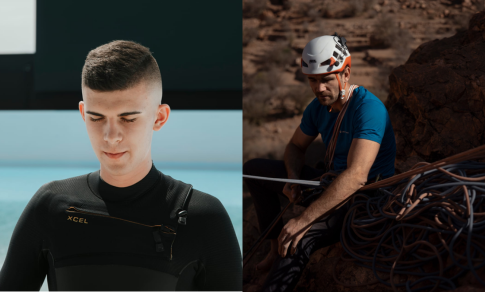Ben Neumann, now 19 years old, lost his sight at the age of eight, yet this hasn’t stopped him from finding his connection with the ocean through surfing. Despite being blind, Neumann takes on the waves with a level of expertise that surprises many. Lying on his surfboard, equipped with a wetsuit and headphones, he follows the instructions from his father, who directs him when to paddle and catch the wave.
Surfing has become more than a sport for him; it’s a powerful reminder that nothing is impossible with the right mindset. Diagnosed with a genetic defect in his retina at six, Neumann's parents made the decision not to treat his blindness as a limitation but as an opportunity to live a normal life. They immersed themselves in the world of blind athletes, encouraging him to ski and, eventually, surf.
At 13, Neumann expressed his desire to surf, which led his parents to find a training program three hours away from their home near Munich. What started as lessons quickly turned into a way of life for him. Guided by his father through wireless headphones, Neumann developed an intimate connection with the waves, relying on his heightened senses to navigate the ocean.
His hearing became his eyes, allowing him to sense the strength and direction of the waves. Neumann’s trust in his surfboard and his instincts brought him success, and in 2021, he was invited to join the German Paralympic surfing team. With no prior experience surfing in the ocean, he trained in Lanzarote and went on to win bronze at the World Championships in California.
Neumann’s achievements highlight his determination, but the sport of surfing has yet to be included in the Paralympic Games, not even for the upcoming 2028 Los Angeles Games. Nevertheless, he continues to pursue his passion, competing in world championships while advocating for the inclusion of surfing in the Paralympics. Surfing, for Neumann, has been a way to defy limitations and strengthen the bond with his father, who has been instrumental in his journey.
Jesse Dufton’s story is another example of an athlete who refuses to be bound by physical limitations. Diagnosed with retinitis pigmentosa, a rare genetic condition that left him with only 20 percent central vision and no peripheral vision, Dufton turned to mountaineering. For Dufton, scaling cliffs and frozen waterfalls is less daunting than crossing a busy street, despite being blind.
His perseverance in the sport led him to complete difficult climbs across the globe, guided by his partner Molly Thompson. Their teamwork and trust, aided by wireless communication, allowed Dufton to overcome not only the physical challenges of climbing but also the mental barriers.
In 2019, a documentary titled ‘Blind Climb’ chronicled Dufton’s ascent of a 137-meter-high rock off Scotland’s northern coast. His story, like Neumann’s, shatters the notion of impossibility, showing that disability is not a barrier to achievement.
Since then, Dufton has continued to conquer more peaks, from Morocco’s Atlas Mountains to cliffs in Greenland and Spain, always pushing the limits of what others might deem unattainable. His belief that the real challenge lies in overcoming inner doubts resonates with anyone facing adversity.








ADD A COMMENT :